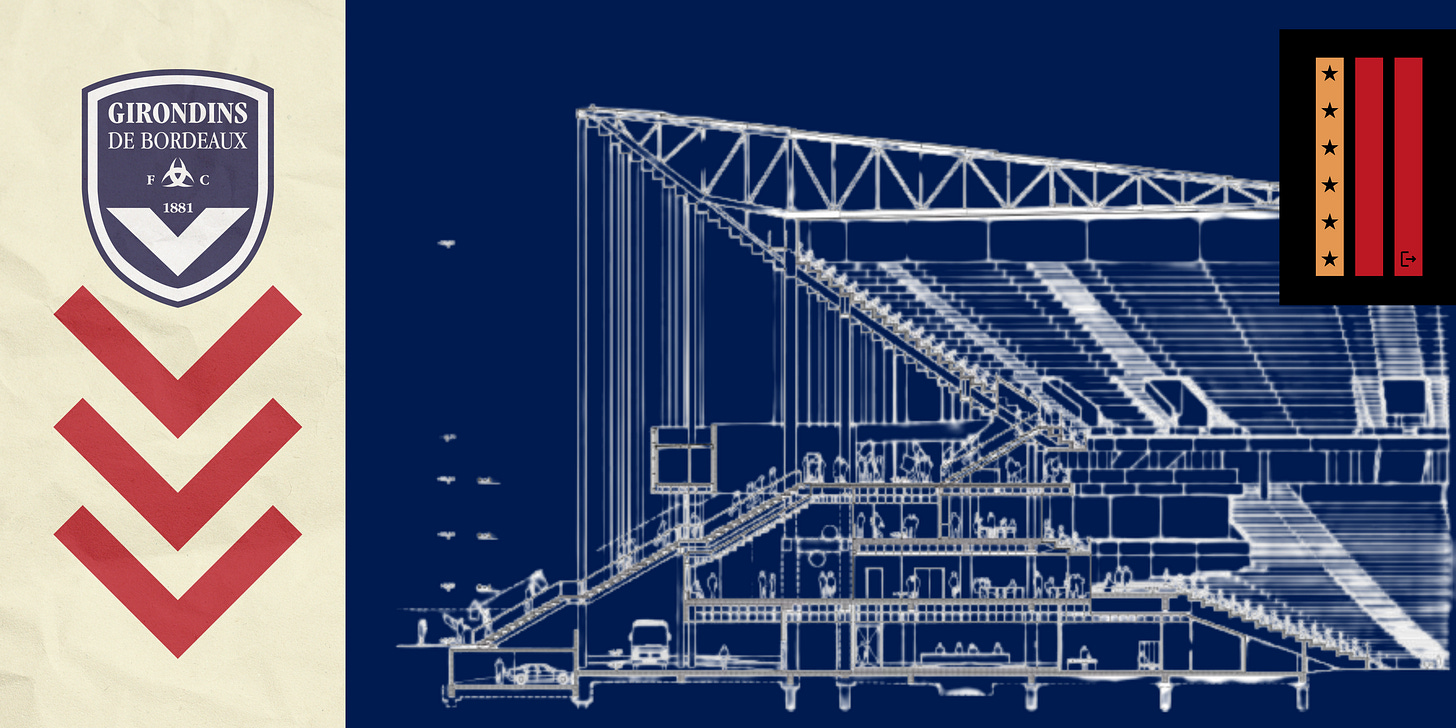French club Bordeaux gave up its professional status following years of financial struggles. The Asterisk takes a look at the former Ligue 1 champions’ latest club accounts and the bleak future that lies ahead.
FC Girondins de Bordeaux informed the French Football Federation (FFF) that it would not be renewing its professional licence, according to French daily Sud Ouest.
“It’s a club that was living beyond its means,” football finance expert Kieran Maguire told The Asterisk. “It was reliant upon the owner to provide funding to subsidise the club and allow it to operate.”
“That’s always a risk that you have if the owner gets bored, runs out of money, or the football club is in a position where it’s going to struggle to trade.”
The six-time French champions' economic hardships caught up with them, leading to their bankruptcy after Liverpool owner Fenway Sports Group (FSG) withdrew from a potential takeover.
So, how did the club perform financially last year?
First profit in three years
Bordeaux announced a net profit in the 2022/23 season after declaring losses in the previous two years, according to the latest French professional football financial report.
Les Girondins reported a net profit of £16.2 million, an increase of £61m from the 2021/22 campaign. A net loss amounting to £44.8m was posted that year after the club finished last and was relegated to Ligue 2.
Player sales and income generated from activities outside of the club’s operations drove the big increase in profits.
The club made a little over £30m from departures, while £26.8m was generated through other activities.
Continued losses from football operations
While the club may have announced a net profit in the 2022/23 campaign, the core business from footballing operations continued to suffer.
Total non-transfer-related expenses exceeded total non-transfer income, resulting in another operating loss for Bordeaux.
The business loss was £37.4m in the 2022/23 season.
Bordeaux had the biggest payroll in Ligue 2, which significantly contributed to the operating loss.
The club’s payroll made up 55% of its total non-transfer expenses.
Wages alone exceeded revenue, resulting in a deficit.
Ligue 2’s impact on revenue
Relegation to Ligue 2 had an impact on Bordeaux’s revenue.
Turnover dropped below the £30m mark in the 2022/23 season.
Total non-transfer earnings decreased by £14m from £41.8m in the 2021/22 campaign.
‘It’s going to get worse’
With the club now relegated to the Championnat National, the third division, revenue is likely to take another hit.
“It’s going to get worse next season,” said Maguire, who runs the podcast The Price of Football.
“FSG took a look at the numbers and didn’t like what they saw,” he explained, describing why the Liverpool owners decided to pull out of a takeover.
“They weren’t willing to offer support. Nobody else was, either domestically or internationally.”
Stadium operating at nearly half capacity
Bordeaux’s stadium, Matmut Atlantique, a modern and elegant piece of architecture that rests within a few kilometres of the Garonne River, has been running at half capacity.
“You’ve now got the problem of a stadium which was built for the 2016 European Championships,” said Maguire.
“It’s bigger than the club needs,” he said. “They’ve got the costs of a 42,000-capacity stadium and they’ve not got the income generated by it.”
The average home ground attendance in the league has been just over 20,000 for the last three seasons.
Matchday revenue saw a 33% drop in the 2022/23 campaign, a £2.1m decrease when compared to the previous season.
The recent developments concerning resident club Bordeaux could have ‘existential’ consequences for the stadium, according to Loïc Duroselle, president of Matmut Atlantique.
Big payroll and pending dues
Non-transfer-related expenses dropped 37% compared to the 2021/22 season.
The club managed to cut down its payroll by nearly £12m.
Money owed to other clubs for previous transfer deals also dropped. Bordeaux paid £5.7m in transfer fees, reflecting a portion of the total amount it owed other clubs for past acquisitions.
Should the club have any pending dues, they are legally obliged to pay those under FIFA, according to Maguire.
“They probably won’t be given a licence until other clubs are paid,” he said. “So if a new club is formed, they might have to effectively be called ‘AFC Bordeaux’ and start off in the sixth or seventh tier of French football and work their way up.”
In 2015, Parma was in a similar situation. The Italian club had to either find a new owner to clear its debts or start afresh in the lower divisions under a new name.
Les Girondins can reduce their debts by restructuring previous transfer deals.
“If you can get the selling club to agree to instalments or to come to some form of haircut, then that might be a solution,” said Maguire.
“Derby County owed money to Arsenal when they went into administration; that had to be settled in full.”
Bordeaux will find it hard to attract new suitors
Bordeaux will find it ‘very difficult’ to attract new owners or investors, according to the football finance expert.
“French football is in a crisis on a much broader level, and you (Bordeaux) are a crisis club in a crisis league,” said Maguire.
“There are far more attractive alternatives to Bordeaux,” he said about investors looking to buy football clubs.
What now for Les Girondins?
The club will release all professional players from their contracts and shut down its famous academy that gave rise to stars such as Zinedine Zidane and Aurélien Tchouaméni.
In July, the country’s football financial watchdog, DNCG, administratively relegated Bordeaux to the third tier of French football.
The club scored a minor victory on Tuesday when the Bordeaux Commercial Court put the Girondins into receivership, giving it a final lifeline.
The receiver will take over Bordeaux’s financial management to help steer the 142-year-old club out of its debts.




